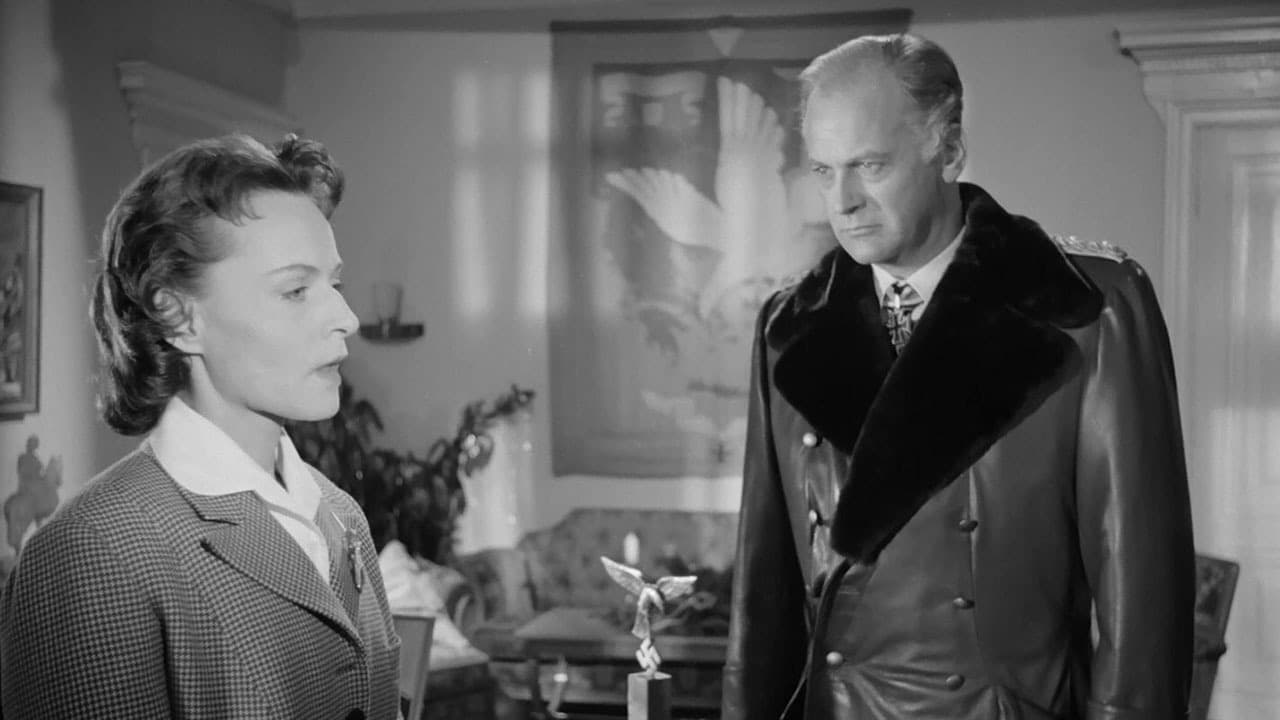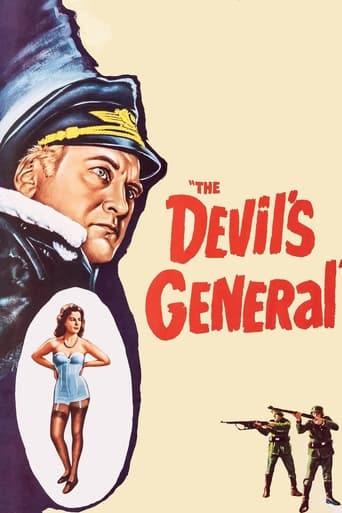KnotStronger
This is a must-see and one of the best documentaries - and films - of this year.
Catangro
After playing with our expectations, this turns out to be a very different sort of film.
Myron Clemons
A film of deceptively outspoken contemporary relevance, this is cinema at its most alert, alarming and alive.
Marva
It is an exhilarating, distressing, funny and profound film, with one of the more memorable film scores in years,
RogerTheMovieManiac88
'Des Teufels General' is set in the months leading up to Hitler's declaration of war on America in December 1941. Curd Jurgens essays the titular general who observes the violent tossing of German society by the torrid and overwhelming waves of the Nazi's mortal storm.Jurgens portrays General Harry Harras, a respected senior official at the Air Ministry. His position is one of authority and he senses the way the wind is blowing. He resists attempts to coerce him into becoming a party member and, as a result, becomes a subject worthy of scrutiny. The movie conveys with searing immediacy the spiralling path of distrust, imprisonment, humiliation and ostracisation that confronts Harras. This movie is a gripping character study of a cognac-nursing general but it is more than just that. It emanates from the American-sponsored era of denazification and offers an intriguing take on German society under the National Socialists. Harras is shown to be chivalrous and a member of a military that has an appreciation of the past and a sense of tradition and camaraderie. There are echoes of 'Anna Karenina' as veteran soldiers dine and drink socially in pleasant surroundings. There is a subtle and effective contrast drawn between the boisterous but essentially civilised bonhomie of Harras and his colleagues and the dispassionate and uncivilised brutishness of the Nazi-established militias. Harras espouses the spirit of Goethe in several electrifying scenes as the degeneration of decency occurs and the thuggery of Nazism takes an iron grip on Germany, working its way into long-venerated edifices of society. While, with hindsight, it seems possible that the movie downplays the extent of committed Nazism amongst the populace, it must be remembered that Germany was undergoing seismic changes in terms of reintegration and structural and economic rebuilding under the Nazi-persecuted statesman Konrad Adenauer. America had initially wanted to identify and prosecute criminally all those who had colluded significantly with the Nazis. This soon proved to be utterly unfeasible and would, undoubtedly, have severely hampered Germany's economic reemergence. Cinematic output of the Adenauer era desperately sought to impart the virtues of dignity and heroism. In alluding to the rampant rise of Nazism, those remaining in society who were swept along are not exonerated. Rather, the terrible, all-consuming enormity of the force that ravaged Germany is acknowledged. In its depiction of Harras and his surroundings, this movie is undoubtedly the product of a deeply scarred society simply doing its level best to move on and locate a measure of hope and honour upon which it can tentatively go forth. As for the acting, special mention must go to Curd Jurgens, who turns in the performance of a lifetime here. He literally becomes General Harras. Indeed, it is hard to imagine anyone else being so effective in the role. For his masterfully nuanced interpretation, Jurgens was the joint winner (with Kenneth More) of the Volpi Cup at the 1955 Venice Film Festival. He is ably supported by the lovely Marianne Koch and the imposing Viktor de Kowa, whose character really is a repulsive individual. This is the first of Helmut Kautner's movies that I have seen and I was suitably impressed by it. His deft narrative style certainly appeals to me. His direction is concise and to-the-point and this contributes to several taut and tense scenes. The atmospheric and chilling evocation of social upheaval is realised with a sure directorial touch. From a brief skimming of his filmography 'Romanze in Moll', 'Der Apfel ist ab', 'Die letzte Brucke' and 'Der Hauptmann von Kopenick' strike me as being some of his most interesting movies. I greatly look forward to viewing more of Kautner's movies in the months and years ahead and I can but thoroughly recommend 'Des Teufels General' to those who read this.
cynthiahost
Remember the producers? Their broad way musical springtime for Hitler? Well in that play the fictitious Broadway Musical made fun of the Nazi's.Carl Zuckmeyers play,made into a film does this dramatically. It's told form a German view point on why they made this mistake in supporting Hitler.Victor Dekowa has always played kind roles ,when he was working under the real Nazi dictatorship. Now he plays a meaty role .An A-hole, SS Leader Scmidt the worst bad character in this film. Dekowa ,that year ,would play a victim of the Nazi government too.Big Band leader Kurt Widmann. Victor must of been an anti Nazi passive.Would Hienz Ruhmann played the same bad guy if the role was offer to him?I don't know. S.s. leader is spying on Industrialist leader or manager of plane craft ,Harry Harras, played Wonderfully by Kurd Jurgens. He's an alcoholic and lusts women.He parties as much as possible.This is suppose to put the idea that Nazi's were womanizers and drunks.He hates the Nazi party he wishes that he did not have to deal with it.Head of the S.s, is spying on him and catches him while he's drunk.He gets arrested a, like Hans Bruasewetter did for being too open against the Nazis'.He's psychologically torturer in prison for weeks. Then all of a sudden he's let out.Victor claims it was a mistake.Then Kurd discovers it wasn't a mistake when he saw a wink . Then he realizes the truth.Now he has to do something about it.The other cast includes Carl Ludwig Deahl,who is the president of the industrial complex ,I think.His character is secretly Jewish an is involved in the under ground against the Nazis,as it is learned later when he commits suicide with a fellow Jew at the park.Harry Meyens ,who was in Darling of the gods, portrays Lieutenant Hartman, who engage to the presidents daughter, the youngest daughter Waltraut, played by Eva Ingebord Scholz, for whom he gets injured ,later on, so then Kurd can take what it requires to make up for his won mistakes Karl John portrays the Engineer of the air craft company, who wore the same uniform when he worked under the Nazi dictatorship, when he starred in the romantic Two in the city, 1942. Camillia Spira portrayed a opera singer and friend of Harry Hass. She worked under the third Reich too as an actress but had to leave Germany in 1938 cause her father Fritz was Jewish He got murdered in a concentration camp and She and her family were put in one until she lied about being Jewish ,which got her out .Marianne Koch,the youngest actress in the film portrays, Dorothy the niece of Olivia.She's an actress too and falls for Harry.This is from a German view point. The party scene celebrating Haas getting an award ,the Nazi citizens and soldiers, upper officials, are acting like normal humans.They with the women are singing and dancing to their favorite pop songs of the time .It isn't marching music or waltzes neither. If the American film makers were to have made this, they would be portrayed as monsters.Cold.The music would be Waltzes or no music at all.they all be talking about Hitler and their plans to controlled the world so the Nazi character are portrayed as human with imperfections.Would Turner classic movies ever premier this? Coming from the German point of view .I don't know.It's available on d.v.d . still 11/23/12
diebestefrau
A movie that I saw for the first time decades ago and numerous times since! Every time I watch it, I discover new facets in Harras'personality. On one hand he is the tough guy, the party animal, the womanizer; however, he shows his softer, almost romantic side when he meets Diddo Geiss. I think that the movie could be a wonderful teaching tool, because it illustrates how "non-political", even rebellious Germans were drawn into the Nazi ideology and paid the ultimate price! Udo Jürgens and Marianne Koch were fabulous together! I would recommend this film for upper level German classes in the US. It is a good addition to "Die weisse Rose" or "Sophie Scholl".
hoffmanu
The epic of Goethe's "Faust" replayed in real life (Ernst Udet, Generalluftzeugmeister, was the source for Zuckmayer's General Harras), and in a play by Carl Zuckmayer. Displays excellently how Germans were suckered into following the modern day "Pied Piper from Austria": Adolf Hitler; and how you have to pay the piper if you follow him. "Denn wer auf Erden des Teufels General gewesen ist und ihm die Bahn gebombt hat, der muss ihm auch in der Hoelle Quartier machen!" - "For whoever was the Devil's General on this Earth, and who bombed the path for him, also has to be his quartermaster in hell!"

